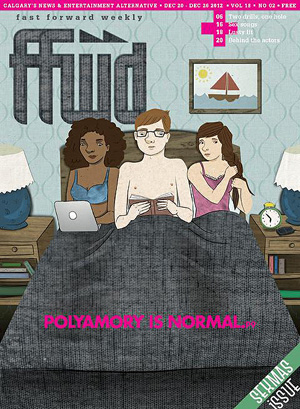It's been a month and a half since the British Columbia Supreme Court ruled in favor of upholding Canada's anti-polygamy law and narrowing its scope. In the poly community, nobody was quite sure how to react to the ruling. Now that the dust has settled, the attorney who represented the Canadian Polyamory Advocacy Association in the case has released an open letter to the Canadian polyamory community.
The attorney, John Ince, is poly himself, and although he thinks that the "scope of the prohibition" is too extreme, he believes that the decision is an overall positive one for polyamorists.
In general terms, I think that the decision allows us to do virtually anything the vast majority of polyamorists would want to do . . . His decision makes it clear that polyamorists are not criminals and this is a major step forward for our community to gain social acceptance and become more integrated into mainstream Canadian culture.
The reason for this, Ince explains, is that the ruling only criminalizes institutionalized marriages that are non-monogamous. Due to the definitions of the words "institutionalized" and "marriage," this law does not apply to poly relationships.
I conclude that given the lack of polyamorous history, sanction or support for "polyamorous marriage," that polyamorous people cannot form the type of marriages that the judge found are prohibited.
I go so far as to say that even if polyamorous people wanted to form such relationships, they cannot. The whole structure of institutionalization that the judge emphasized over and over again as key to his decision is simply lacking in our community.
. . . Because there is no polyamorous institution of marriage, how far can polyamorous people go in celebrating and formalizing their relationships? In my view: probably as far as they want.
So, polyamorists are free to have ceremonies, take vows of love, and exchange rings. To remove any legal risk, Ince suggests that any commitment ceremony refrain from using the word "marriage," or if that is not possible, avoid including any "official" in the process. A marriage is not a marriage under the law unless it is enforced by an institutionalized sanctioning authority.
And there are other upsides to the ruling, Ince explains.
Because the court found that polyamorous relationships that are not institutionalized into a form of marriage are lawful, people in such relationships no longer have to face the chilling argument in child custody, immigration or other matters that they are criminals. That is obviously a very positive outcome of this case.
Further, nothing in this case prevents people in cohabiting polyamorous relationships from entering contracts with respect to most key family issues, such as community property and the care of children, and hospital privileges.
For more in-depth, specific information on the implications of the Canadian ruling for the poly community, read Ince's full statement.
 Fast Forward Weekly is a progressive newspaper distributed to 1,300 coffee shops, restaurants, stores, and other locations around Calgary, Alberta. A couple weeks ago, a story on polyamory made it to the cover, along with the words "POLYAMORY IS NORMAL."
Fast Forward Weekly is a progressive newspaper distributed to 1,300 coffee shops, restaurants, stores, and other locations around Calgary, Alberta. A couple weeks ago, a story on polyamory made it to the cover, along with the words "POLYAMORY IS NORMAL."